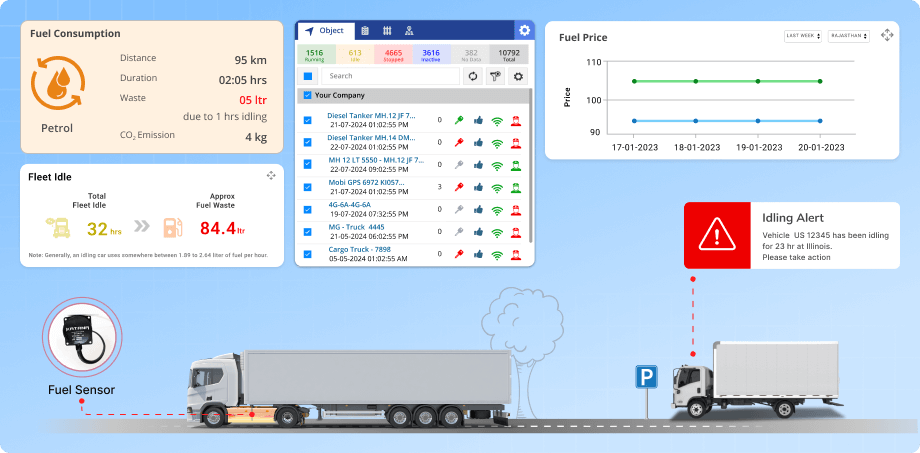In Illinois, fleet operators are under pressure to do more with less. They have to maximize the use of every vehicle while minimizing unnecessary fuel expenses. Whether managing delivery vans in Chicago or utility trucks in smaller towns, many fleets struggle with uneven vehicle usage and long idle times. Some vehicles run nonstop, while others sit underutilized. Meanwhile, excessive idling continues to drain fuel and violate local anti-idling laws. Without advanced fleet GPS tracking, these inefficiencies go unnoticed. That’s why many Illinois-based fleet managers are now turning to vehicle tracking software. This helps to monitor usage patterns, cut idle time, and get more productivity from every asset on the ground.
Maximizing vehicle usage in Illinois through advanced fleet GPS tracking
Introduction
Challenges
- Uneven vehicle usage across the fleet
Some vehicles are overused while others remain idle for days. Without clear insights into daily usage, managers cannot identify underutilized vehicles or plan workloads effectively. This leads to poor asset return on investment. - Excessive idling goes unnoticed
Vehicles often remain idle during loading, breaks, or route delays. Without real-time data, managers are unaware of how much fuel and engine life is being wasted due to prolonged idling. This is especially common in urban areas with traffic or delivery bottlenecks. - No visibility into trip productivity
Fleet operators often lack reports that break down trips by purpose, distance, or outcome. This makes it hard to distinguish between productive travel and inefficient movement, such as short trips with little operational value. - Missed opportunities for fuel savings: Fuel costs rise when idling and underuse go unchecked. Without linking these inefficiencies to fuel consumption data, companies lose the chance to implement targeted strategies that reduce wastage.
- Failure to meet Illinois idling regulations : The state enforces limits on how long diesel vehicles can idle. Without automated monitoring, fleets risk non-compliance. This can lead to unexpected fines and reputational issues.
Solution
- Track vehicle usage with fleet utilization reports: The software automatically logs how frequently and how long each vehicle is used. Managers can compare usage patterns across the fleet to identify underutilized vehicles and rebalance workloads for better efficiency.
- Monitor and reduce idling with real-time alerts: Vehicles that remain idle beyond the allowed limit trigger instant alerts. This helps fleet managers take quick action to reduce unnecessary idling and stay aligned with Illinois anti-idling laws.
- Analyze trip summaries to identify inefficiencies: Detailed trip reports show distances traveled, engine hours, idle time, and stop durations. This allows managers to spot unproductive trips and take steps to eliminate wasted movement.
- Link usage data with fuel consumption metrics: By combining vehicle usage data with fuel monitoring, the software highlights where fuel is being wasted due to idling or underuse. This helps companies make informed decisions to improve fuel efficiency.
- Automate maintenance based on actual usage: Instead of relying on fixed schedules, the system schedules maintenance based on how much a vehicle is used. This ensures overused vehicles get timely service while reducing unnecessary maintenance on low-use assets.
Results
- Up to 35% reduction in cargo spoilage: Continuous temperature tracking and instant alerts helped prevent exposure to unsafe conditions, ensuring that perishable goods arrived in proper condition.
- 50% faster compliance reporting: With automated logs and ready-to-download temperature reports, audit preparation time was cut in half, making regulatory checks easier and more efficient.
- 20% savings in operational costs: Improved route planning and early identification of equipment issues helped reduce fuel use, avoid losses, and minimize unnecessary trips or spoilage-related claims.




